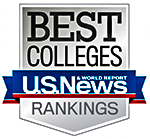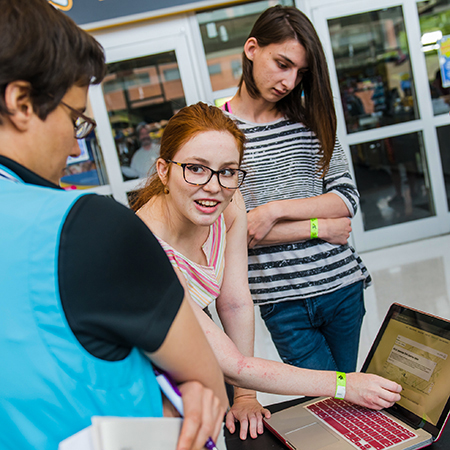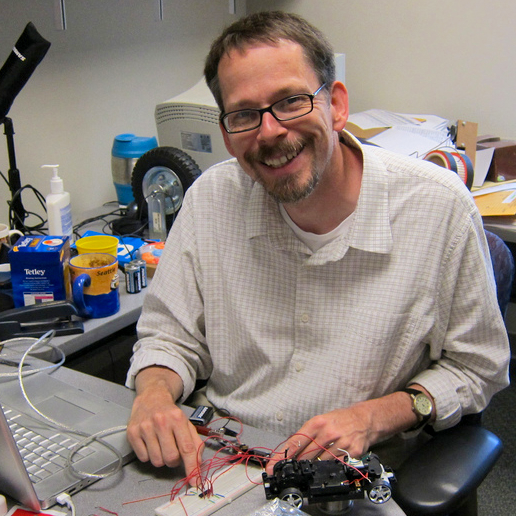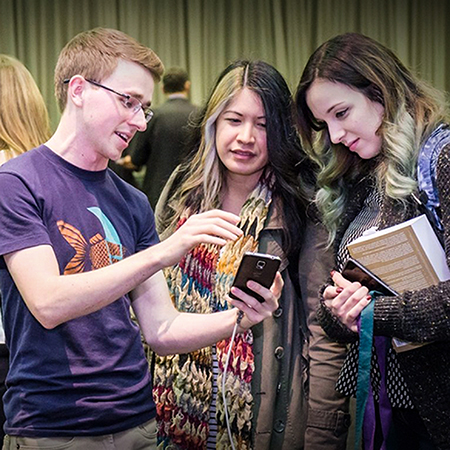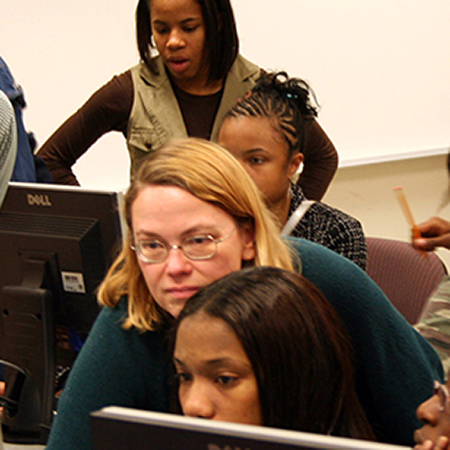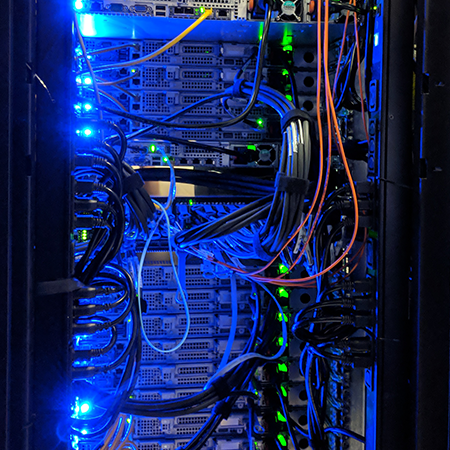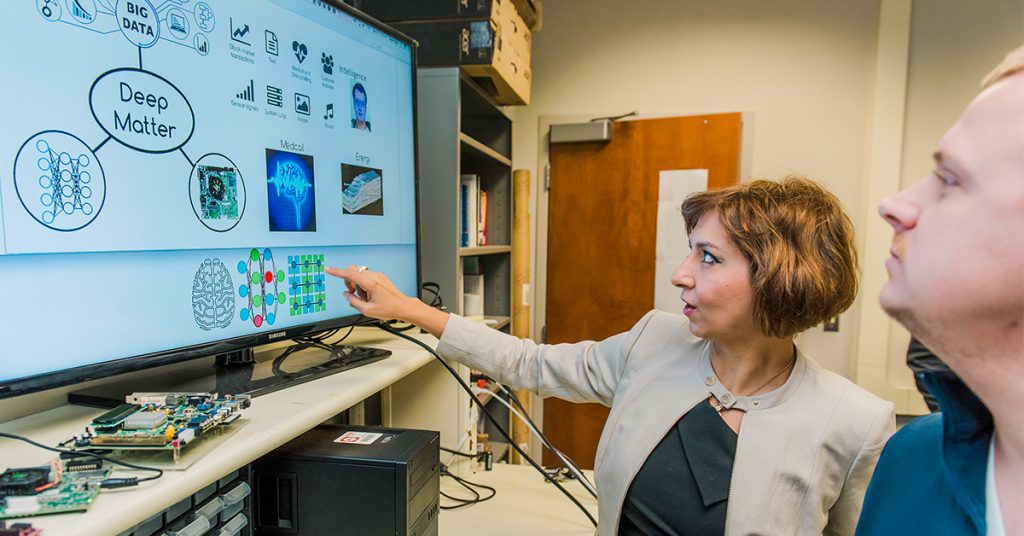
Computer Science Professor
Two tenure-track, open rank positions
University of Maryland, Baltimore
County (UMBC)
Department of Computer Science and Electrical
Engineering
The University of Maryland, Baltimore County (UMBC) Department of Computer Science and Electrical Engineering (CSEE) invites applications for two, open rank, tenured/tenure-track positions in Computer Science (CS) to begin in the Fall of 2020. Applicants should have or be completing a Ph.D. in a relevant discipline, have demonstrated the ability to pursue a research program, have a strong commitment to undergraduate and graduate teaching, and a strong commitment to diversity and inclusive excellence. Candidates will be expected to build and lead a team of student researchers, obtain external research support, and teach both graduate and undergraduate courses.
We welcome candidates in all areas of specialization in Computer Science. Some areas of interest for applicants include but are not limited to: information assurance and cybersecurity; mobile, wearable, and IoT systems; big data with an emphasis on machine learning, brain-inspired methods, and high-performance computing; knowledge and database systems; and graphics and visualization.
We are committed to inclusive excellence and innovation and welcome applications from women, minorities, veterans, and individuals with disabilities. UMBC is an affirmative action/equal opportunity employer.
The CSEE department is research-oriented and multi-disciplinary with programs in Computer Science (CS), Computer Engineering (CE), Electrical Engineering (EE), Data Science, and Cybersecurity. Our faculty (37 tenure-track, 16 teaching, and 18 research) enjoy collaboration, working across our specializations as well as with colleagues from other STEM, humanities and the arts departments, and external partners. We have more than 2,000 undergraduate CS and CE majors and more than 560 M.S. and Ph.D. students in our CS, CE, EE, Data Science, and Cybersecurity graduate programs. We have awarded 340 Ph.D. degrees since our establishment in 1986. Our research is supported by a growing and diverse portfolio from government and industrial sponsors with over $6M in yearly research expenditures. We work to help new colleagues be successful by providing competitive startup packages, reduced teaching loads, and active mentoring.
The College of Engineering and Information Technology (COEIT) at UMBC crosses the boundaries of engineering, computing, and information disciplines to develop research and educational programs that engage faculty, students, and staff from all of the disciplines. COEIT is deeply committed to the success of all of our faculty. We have formal programs including “launch committees” to encourage regular and structured mentorship for faculty to start successfully, mentoring programs to provide support in the longer term, shared services for grant finance support, grant writing and editing support, monthly gatherings in which faculty share lunch and community, and we encourage all of our faculty to participate in the university’s eminent scholar mentor program to build relationships with leaders in the field beyond UMBC. You can read more about these programs and our Diversity & Inclusion initiatives on our website at https://coeit.umbc.edu.
The University of Maryland, Baltimore County (UMBC) community redefines excellence in higher education through an inclusive culture that connects innovative teaching and learning, research across disciplines, and civic engagement. We advance knowledge, economic prosperity, and social justice by welcoming and inspiring inquisitive minds from all backgrounds (http://facultydiversity.umbc.edu). According to the 2020 US News and World Best Colleges Report, UMBC placed 9th in the Most Innovative Schools category and 12th in the Best Undergraduate Teaching category. To continue to support this goal, the Faculty Development Center leads the Nation in supporting and guiding faculty in their educational mission with regular workshops and pedagogical demonstrations. The 2018 Chronicle of Higher Education also named UMBC as a Great College to Work For, for the ninth year in a row.
UMBC is a research-intensive university that is leading the world in inclusive excellence in research and teaching. We are redefining how to teach, and we are one of the most innovative universities in the Nation, according to US News. Our research is bold, cross disciplinary, and leverages our location near to the hospitals in Baltimore, NIH, NASA, NSF, and the USGS. Inclusive excellence also means being a strong community partner in Baltimore, and the UMBC Shriver Center and Center for Democracy and Civil life help forge and maintain connections. Social justice is core to our role in Baltimore, Maryland, and beyond.
UMBC’s campus is located on 500 acres just off I-95 between Baltimore and Washington DC, and less than 10 minutes from the BWI airport and Amtrak station. The campus includes the bwtech@UMBC research and technology park, which has special programs for startups focused on cybersecurity, clean energy, life sciences, and training. We are surrounded by one of the greatest concentrations of commercial, cultural, and scientific activity in the nation. Located at the head of the Chesapeake Bay, Baltimore has all the advantages of modern, urban living, including professional sports, major art galleries, theaters, and a symphony orchestra. The city’s famous Inner Harbor area is an exciting center for entertainment and commerce. The nation’s capital, Washington, DC, is a great tourist attraction with its historical monuments and museums. Just ten minutes from downtown Baltimore and 30 from the D.C. Beltway, UMBC offers easy access to the region’s resources by car or public transportation.
Qualifications
Applicants should have or be completing a Ph.D. in a relevant discipline, have demonstrated the ability to pursue a research program, and have a strong commitment to undergraduate and graduate teaching. Candidates will be expected to build and lead a team of student researchers, obtain external research support, and teach both graduate and undergraduate courses.
We welcome candidates in all areas of specialization. Candidates that have research interests in collaborative areas between CS, CE and Electrical Engineering are encouraged to apply.
Some areas of interest for CS applicants include but are not limited to: information assurance and cybersecurity; mobile, wearable, and IoT systems; big data with an emphasis on machine learning, data science, brain-inspired methods, and high-performance computing; knowledge and database systems; visualization.
Some areas of interest for CE applicants include but are not limited to: hardware focused applicants in Digital, Analog, Mixed-mode VLSI design and test, integrated sensors and processing, SoC, new and emerging design technologies, hardware implementations for neuroscience and health-related wearables, cyber physical systems, hardware security and assurance.
Application Instructions
Applicants should submit a cover letter, a statement of research experience and interests, a statement of teaching experience and interests, a statement of commitment to diversity and inclusive excellence, a CV, and three letters of recommendation via interfolio. For full consideration, please submit application materials by January 15th, 2020. Applications will be accepted until the position is filled. Please send questions to and see http://csee.umbc.edu/jobs for more information.


